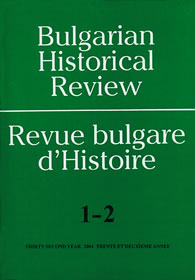Българското възраждане и проблемите около историческата приемственост в ново и най-ново време
The Bulgarian Revival and the Problems of Historical Continuity in Modern and Contemporary Times
Author(s): Angel DimitrovSubject(s): History
Published by: Институт за исторически изследвания - Българска академия на науките
Summary/Abstract: This research is organized around three interrelated topics: the nature of the Bulgarian Revival and the reasons for its pivotal place in the Bulgarian historical continuum; the National Revival-time heritage reconstruction and interpretation during other major successive national development periods; and its role in conducting a historical succession. Through analyzing certain characteristic features of the Bulgarian Revival, this article tries to present the socio-cultural and political mechanisms that turned it into an epoch of emblematic significance. Its interpretation and usage can function in two ways: either as a point of orientation and ideal or as a shelter and decoration. Being examined in the context of the global changes attending the Modern times, the Bulgarian National Revival can be seen as an example of „the simultaneous occurrence of the non-simultaneous one“. This time is symbolically expressed as an era of change and piety towards social progress. Being realized under historical circumstances that blocked up, deformed and restrained from developing the Bulgarian national community these overall transformations became politically featured. Even it might be differently viewed, this characteristic of the National Revival process is outstanding when building in the epoch in the twentieth century public life of Bulgaria.
Journal: Bulgarian Historical Review / Revue Bulgare d'Histoire
- Issue Year: 2006
- Issue No: 1-2
- Page Range: 188-215
- Page Count: 28
- Language: Bulgarian
- Content File-PDF

